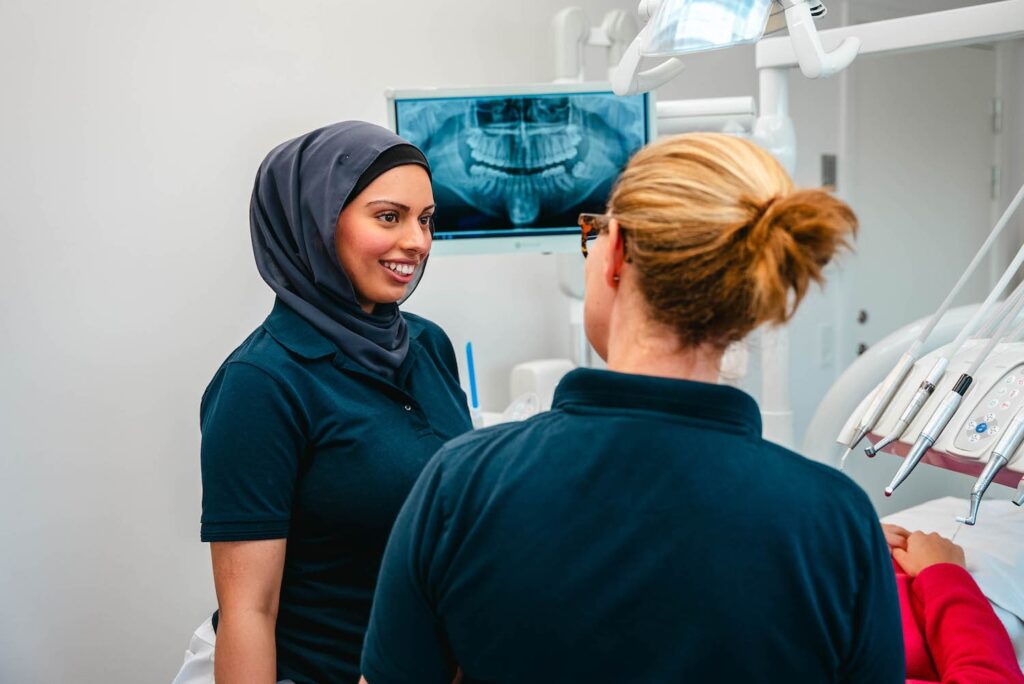
The word prosthesis comes from the Greek "Prosthesis," meaning "an addition." We can handle all types of dental prosthetic treatments.
The process of getting a dental prosthetic can often raise a lot of questions. We're here to guide you through the process with confidence so you can get back to a healthy smile. Here is a selection of frequently asked questions:
- What are the different types of dentures available?
- How do I maintain my dentures?
- What do I do while waiting?
What is a prosthesis?
A denture is a removable replacement for one, several or all teeth. The word prosthesis comes from the Greek "Prosthesis," meaning "an addition."
There are 2 different types of prostheses: partial and full dentures.
What are the different types of dentures available?
Partial dentures
Refers to dentures that replace some, but not all, teeth in a jaw. These fixed dentures are set in a metal frame that is held securely in the mouth by a combination of elastic brackets and attachments in small notches cut into the remaining teeth.
A partial denture therefore fits better in the mouth than a full denture and is easier to control.
It is a misconception that partial dentures destroy neighboring teeth. The enamel of the teeth is far too durable for braces to wear holes. But coatings can still cause gaps. If you lose additional teeth, a partial denture can be extended with extra teeth as needed.
Full dentures
Many people, especially the elderly, have had little opportunity to preserve their teeth and may need a denture to replace all teeth in the upper or lower jaw.
It's important to check whether the remaining teeth are really so bad that they need to come out, as even a single tooth can be enough to hold a partial denture in place and it will be easier to control. That said, it's definitely possible to grow fond of full dentures.
They can be made so lifelike with gold crowns and possibly darker teeth that friends and family won't be able to tell the difference between the old teeth and the new dentures. And it is no longer necessary to go toothless for a period of time, as in the past.
The prosthesis can be placed in the mouth immediately after the last tooth is extracted - and will actually protect the open wound and reduce discomfort after tooth extraction.
How do I maintain my dentures?
You can't say a healthy smile without saying good maintenance. That's why it's important that you know how to keep your dentures clean. Just as you've always done with your natural teeth, dentures require thorough brushing.
It can be beneficial to remove the denture from your mouth during the brushing process. We also recommend that you rinse your dentures regularly, especially after a meal, as food residue can build up under the dentures.
When rinsing your dentures, it is important that you do not use hot water as this may cause changes to the shape of the denture. You should also pay special attention to the type of toothpaste you use, as some types of toothpaste can wear down the surface of your dentures.
Talk to us if you are unsure if your toothpaste is optimal for your dentures.
Remember that the path to a healthy mouth includes a healthy tongue. That's why you should always keep in mind that when you clean your dentures, remember to brush your tongue at the same time.
What do I do while waiting?
If you have had your teeth extracted, we can fit a temporary denture so that you are not toothless between the initial and final stages of the process. In addition to its aesthetic effect, a temporary denture (also called an immediate denture) protects your mouth in several ways.
The function of immediate dentures is to contribute to the healing process of the gums and stop any bleeding. Of course, we make sure that your immediate denture is matched to your mouth, so you won't suffer any inconvenience while you wait for your real denture.
Learn more about what prosthetics are made of and which ones are available.
FAQ - dentures
There are different types of dentures designed to replace missing teeth. Full dentures are used when all teeth in the upper or lower jaw need to be replaced. Partial dentures are suitable when several missing teeth need to be replaced and are supported by adjacent natural teeth. Implant-supported dentures attach to dental implants for increased stability and comfort, while fixed bridges are artificial teeth that attach to natural teeth or implants. We will be able to guide you on the best prosthetic solution for your needs.
You can sleep with a denture, but it is often recommended to remove it at night. Removing the denture gives both the gums and bone tissue a chance to rest and breathe, which promotes oral health. In addition, the denture should be cleaned and stored in a container of water or denture cleaner to keep it moist and prevent deformation.
The terms 'denture' and 'denture' are often used interchangeably and refer to a removable prosthesis that replaces missing teeth and surrounding tissue. Both terms cover different types of dentures, such as full dentures that replace all teeth in a jaw and partial dentures that replace multiple missing teeth. Regardless of the term used, the aim is to improve chewing function, speech and aesthetics for people with missing teeth.
Contact us and get advice
If you have any doubts or questions, don't hesitate to contact us.

- I look forward to meeting you in the clinic.
- Dental clinic assistant
Selma graduated as a dental assistant from the Panumin Institute in 2001. She has worked as a dental assistant at Tandlægerne Enghave Plads 6 since 2007.
Working primarily with dentist Mats Gade Philipson, Selma has a special interest in dental anxiety, surgery/implants and cosmetic dental treatments.
She has expertise in CBCT and OP scanning, impressions, prophylaxis, endo/root canal therapy and PFR blood sampling.
Contact Tandliv for questions
Do you have questions about prices or the treatment process?
Contact Tandliv today and get answers to your questions.

